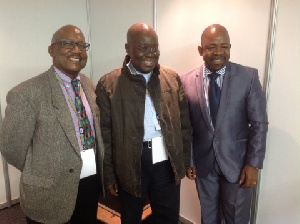The Chair of the Commonwealth Observer Mission for the May 7 South African national and provincial elections, Nana Addo Dankwa Akufo-Addo, on Sunday, met with Commissioners of the Independent Electoral Commission (IEC) of South Africa, the permanent body created to promote and safeguard a credible electoral system in the country.
The meeting, organised by the IEC, was intended to brief international observers, who have been accredited to monitor Wednesday’s elections, including a large African Union (AU) contingent, led by President J.A Kufuor, and a group from the Southern African equivalent of ECOWAS, the Southern African Development Community (SADC), about the preparedness of the Commission and the measures that have been put in place to ensure a successful election.
The briefing, which was held at the Results Operation Centre of the IEC, located at the Pretoria Show Grounds, had the deputy Chairperson of the IEC, Mr. Terry Tselane and Mr. Granville Abrahams, Manager of Electoral Affairs, briefing observers present at the meeting.
According to Mr. Tselane, there are four key areas which will determine whether the elections in South Africa will be credible or not. These areas, he stated, include the quality of the voters’ register, quality of the electoral staff, quality of logistics for Election Day, and finally a conducive political environment.
He explained that a total of 25,390,159 South Africans had been registered for the elections, out of a population of some 53 million people, representing 47.9% of the total population. He further indicated that a total of 218,000 electoral staff had been properly trained and were ready for deployment. In addition to the 218,000 electoral staff, Mr Tselane revealed that a “buffer staff” had been trained and were on standby to be deployed to polling stations which face logistical and operational difficulties on Election Day.
Mr. Tselane added that all election materials, as at Sunday, had been distributed to all the polling districts in the country. He therefore assured the observers that the IEC was satisfied about what they had achieved so far and were ready to deliver a credible, free, fair and transparent election come May 7.
Electoral Affairs
Mr. Granville Abrahams, the IEC’s Manager for Electoral Affairs, also briefed the observers on the operational processes that have led to the May 7 elections.
He pointed out that a total of 22,263 polling districts had been set up for the elections. Out of this number, 1,255 voting districts, where voter populations are high, will have “sub-centres”, whose aim is to ensure that the time it takes for voters to cast their ballot is drastically reduced.
Mr. Abrahams indicated that maps, containing the IEC’s proposed locations for electoral districts, are given to political parties for their inputs to be made as to whether they agree or otherwise to the location of these districts.
As contained in the electoral legislation, Mr. Abrahams revealed that there has been a continuous registration of voters in the country. Also, a period of 2 weeks was given for the registration of voters abroad, with more than 26,000 voters registering to vote on May 7. Prisoners were also allowed to register, he added.
On the training of the 218,000 electoral staff, he stated that the training was “broken down into 3 modules”. The first training module, Mr. Abrahams said, was on the importance of democracy, with the second training on the registration of voters. The third and final training module, he added, was Election Day processes and activities.
“Public servants, municipal officials, teachers and other volunteers make up the 218,000 strong electoral staff,” he added.
Mr. Abrahams said that special voting was open to all voters, who for one reason or the other cannot vote on voting day, as well for all those who are sick “and qualify for a home visit.”
Ballot papers, the IEC man revealed, have numerous security features embossed on them, thus making it difficult to counterfeit.
Declaration of Results
According to Mr. Abrahams, the law requires that results of elections must be announced within 7 days after the close of polls, stressing that results cannot be declared within the first 48 hours. This, he maintained, was very important so as to ensure that appeals from political parties that may impact the final results are addressed before final declaration is made by the IEC.
He also explained that an audit of the results at every counting station is done by an internationally recognised audit firm, before the final results are transmitted to the IEC’s Results Operation Centre.
Nana Akufo-Addo was accompanied by the other two members of the Observer Mission, Hon. Dorothy Pine-McLarty OJ, Chairperson of the Electoral Commission of Jamaica, Sheikh Abdul Carimo Nordine Sau, who is the President of the National Elections Commission of Mozambique and a team from the Commonwealth Secretariat.
Politics of Tuesday, 6 May 2014
Source: Office of Akufo-Addo

















